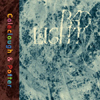 Released back in 2008, Bad Light represents a lull in both Coleclough and Potter's discography. The duo showcases a number of musical conventions new to their repertoire, but the result is a suprisingly dull and somewhat derivative record.
Released back in 2008, Bad Light represents a lull in both Coleclough and Potter's discography. The duo showcases a number of musical conventions new to their repertoire, but the result is a suprisingly dull and somewhat derivative record.
The first time I put Bad Light on I was sure it would end up being Coleclough and Potter's best record. From the second it begins, it is clear that the duo intends to explore new territory. Instead of processed noise or ambient drones, the album begins with a guitar being tuned up and down, plain as day. Jonathan has utilized acoustic sources to produce phenomenal ambience in the past (i.e., Sumac, with Andrew Chalk), but I can't recall Colin or Jonathan ever using them as much as they do on this album. With the focus set squarely on echo-rich percussion, detuned guitar, and field recordings, both musicians apparently forgot how to pace or arrange their noise. Bad Light sounds like someone practicing on new equipment or ironing out loops before taking them on the road. In fact, it's so minimal that it sounds like a demo instead of a finished product.
"Good Shepherd" opens with the above mentioned guitar, but goes almost nowhere from there. A drone slowly fades in after a few minutes and, by the time the song is over, it sounds a little bit like a car engine at the point of breaking down. Imagine driving an old truck down the highway at 18 miles-per-hour in second gear and then tossing a bandsaw into its bed: that's how the song sounds in its closing moments. Over the course of 14 minutes very little happens in "Good Sherpherd": the guitar fades away and a roar of sound takes its place. The noise is intense and a little disturbing, but I have heard that same effect generated in more interesting ways. In fact, both Jonathan and Colin are very good at generating tension, so why they took such an easy (and colorless) route on "Good Shepherd" is a little bit of a mystery.
The second song, "Mumps," suffers from a similar problem. For nearly a half hour it buzzes and moans away to the tune of metal percussion, gongs, and wooden blocks. At first I thought the extra instrumentation would give Bad Light some much needed diversity, but the song goes on for far too long and wears out its welcome quickly. Records like Sumac and Period were rich and mysterious enough to warrant prolonged running times, but after 10 minutes "Mumps" offers up everything its going to offer. Frustratingly, it isn't even half way over by that point. I had to force myself not to skip the song just in case something cool did happen. Obviously, it takes a lot more than softly struck bells and blocks to make a weak drone strong.
And that brings me to the album's greatest flaw: its focus on everything but the drone. Too much of Bad Light's time is dedicated to acoustic sounds and field recordings instead of solid walls of sound. "Bad Light," the album's closing piece, illustrates this perfectly. It's also a half-hour in length, but the first sound it makes is an awkward, belching kind of noise. The song moves slowly, but introduces new elements quickly, each of which are vibrant and vivid and contribute to the single massive wave of sound that ends up dominating the piece. Perhaps most importantly, Coleclough and Potter's drones take center stage for the entirety of the song, which is precisely how it should be. Keeping all the miscellaneous found-sound stuff in the background ends up making all the difference in the world.
The constantly evolving texture and undulating development of "Bad Light" make for a far more involved listen than the sounds of randomly struck percussive things and poorly played guitars. Its various drones breathe and move naturally and the song just sounds more complex in general. Without extraneous samples getting in the way, "Bad Light" has the chance to become immersive, which means it has the chance to put all of its 30 minutes to good use. The same just can't be said for the rest of the album. The final song is the longest and strongest of the three yet it isn't strong enough to save the album from its own mediocrity.
samples:
Read More

